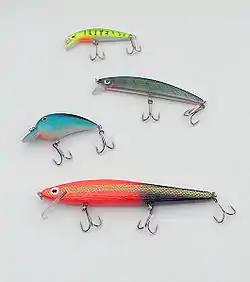lure
English

Some fishing lures
Etymology 1
From Anglo-Norman lure, from Old French loirre (Modern French leurre), from Frankish lothr, from Proto-Germanic *lōþr-. Compare English allure, from Old French.
Pronunciation
Noun
lure (plural lures)
- something that tempts or attracts, especially one with a promise of reward or pleasure
- (Can we find and add a quotation of Milton to this entry?)
- (fishing) an artificial bait attached to a fishing line to attract fish
- a bunch of feathers attached to a line, used in falconry to recall the hawk
- 1594, William Shakespeare, The Taming of the Shrew, IV. i. 178:
- My falcon now is sharp and passing empty, / And till she stoop she must not be full-gorged, / For then she never looks upon her lure.
- 1594, William Shakespeare, The Taming of the Shrew, IV. i. 178:
- a velvet smoothing brush
- (Can we find and add a quotation of Knight to this entry?)
Translations
tempting or attractive object
|
|
artificial fishing bait
Verb
lure (third-person singular simple present lures, present participle luring, simple past and past participle lured)
- to attract by temptation etc.; to entice
- to recall a hawk with a lure
Related terms
Translations
to entice
|
- The translations below need to be checked and inserted above into the appropriate translation tables, removing any numbers. Numbers do not necessarily match those in definitions. See instructions at Wiktionary:Entry layout#Translations.
Translations to be checked
|
Etymology 2
Borrowed from Icelandic lúðr
Norwegian Bokmål
Etymology 2
From Middle Low German luren
Norwegian Nynorsk
Old French
Etymology
From Frankish
Noun
lure f (oblique plural lures, nominative singular lure, nominative plural lures)
- lure (bunch of feathers attached to a line, used in falconry to recall the hawk)
Descendants
- English: lure
References
- lure on the Anglo-Norman On-Line Hub
This article is issued from Wiktionary. The text is licensed under Creative Commons - Attribution - Sharealike. Additional terms may apply for the media files.